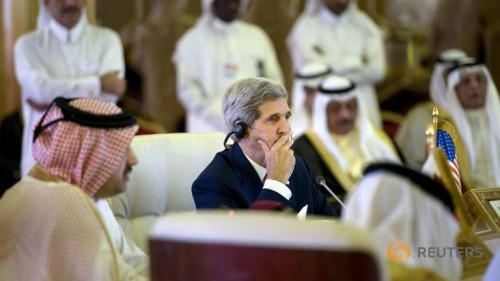PHOTO: US Secretary of State John Kerry listens during Monday’s Gulf Cooperation Council summit (Brendan Smialowski/Reuters)
Arab Gulf States have given a cautious endorsement of the July 14 nuclear deal between Iran and the 5+1 Powers.
At a summit of the Gulf Cooperation Council, attended by US Secretary of State John Kerry, Qatar’s Foreign Minister Khalid al-Attiyah said, “This was the best option among other options. We are confident that what they undertook makes this region safer and more stable.”
Kerry and Arab counterparts agreed to speed up American military support and training promised by President Obama in May.
Attiyah said, “[Kerry] let us know that there is going to be live oversight over Iran not to gain or to get any nuclear weapons. This is reassuring to the region.”
In contrast to the loud objections from Israeli officials and US critics, the Gulf States were muted in their response to the agreement which limits Iran’s nuclear programs in return for a lifting of US-led sanctions on Tehran.
Tehran is trying to use the deal as a bridge to engagement with some Arab States. Foreign Minister Mohammad Javad Zarif visited Kuwait, Oman, and Iraq last week.
There has been no sign so far of a thawing in Iran-Saudi tensions, stoked by the Islamic Republic’s support of Syrian President Assad and Riyadh’s military intervention in the Yemen crisis. However, Iranian Deputy Foreign Minister Hossein Amir Abdollahian told the English-language Iran Daily:
We believe that Tehran-Riyadh ties must return to normal and acceptable….Iran and Saudi Arabia can settle mutual problems in addition to regional crises through constructive cooperation and interaction.
Amir Abdollahian claimed Iran has received positive signs from Saudi officials on the resumption of “explicit, constructive and effective” dialogue to “fight extremism and terrorism and establish stability in the region”.

